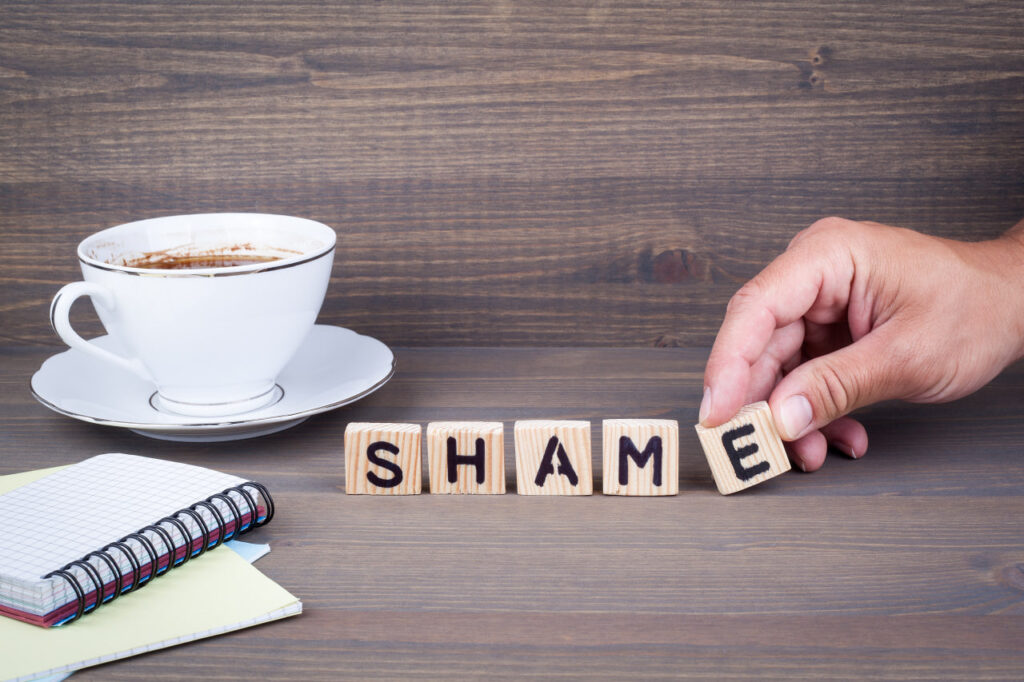Childhood trauma and shame
As a trauma therapist who works mostly with childhood trauma survivors, I often work with clients who struggle with a chronic feeling of shame. One of my clients described her feeling of shame as ” shame gravy”; it clanged to her emotionally, was “sticky” and was hard to shake off. Childhood trauma and shame are closely connected. Unfortunately childhood trauma can leave us with a deep-seated feeling of unworthiness and give us the sense that there is something wrong with us, that we are somehow “less”, or that no one will like us if they see the “real us”. This deep-seated shame from childhood trauma can carry into our adult lives and can manifest in many different forms of mental health struggles such as social anxiety, depression, low self-esteem, the desire to self-isolate, self-harm or suicidal thoughts.
Complex trauma survivors also often have a hard time distinguishing shame from guilt. Failing to distinguish between shame and guilt can be harmful because these emotions have distinct psychological impacts and can lead to different outcomes in terms of mental health and well-being.

In this blog post, I want to first use an imaginary scenario to show how shame becomes entrenched in our psyche when we go through childhood trauma. I would then like to elaborate on the difference between shame and guilt, why many of us have difficulty distinguishing shame from guilt and why the distinction is an important part of our healing journey.
1)AN IMAGINARY SCENARIO TO SHOW HOW CHILDHOOD TRAUMA AND SHAME ARE CONNECTED
Let`s start by an imaginary scenario:
Imagine Leo, a 9-year-old, who slaps his younger sister as an attempt to show how frustrated he is with her taking away his toy. Leo`s mom comes in and yells “you are such as bad boy Leo. I wish you were never born” and then gives him a look full of disgust. His father then walks in to yell at him and send him to his room to be punished for being “selfish”. Now imagine Leo hearing this sentence and getting this look from his mom hundreds of times through his childhood.

What does Leo naturally start to believe about himself? First, he probably starts to believe that maybe he is a “bad” person. After all, Leo, like most children, believes that his parents know the best, and he concludes that if his parents think he is bad, then he probably is. This usually becomes a deep-seated shame that can carry well into his adulthood. As an adult, Leo might not remember many (or any) of these childhood events. He might only notice a chronic sense of worthlessness, of being inferior and of not wanting to exist. He might avoid situations or people that remotely trigger this sense of shame and inadequacy or might develop anxiety, depression, substance use or suicidal thoughts.
Secondly, Leo also never learns the distinction between “doing” something bad vs “being bad” and starts to feel a deep sense of shame or being “flawed” and “worthless” anytime he does something wrong. In other words, healthy guilt and unhealthy shame become blended in his mind. As an adult, Leo might spiral into shame anytime his partner tells him he has done something wrong. This can be as simple as his partner telling him that he forgot to pay the bill on time. He might immediately get sucked into the shame vortex thinking that he is worthless, and his partner might be better off without him.
2)shame FROM CHILDHOOD TRAUMA VERSUS HEALTHY GUILT: WHY THE DISTINCTION IS IMPORTANT
As you can see, many childhood trauma survivor have difficulty distinguishing healthy guilt from shame. Guilt is the feeling of discomfort we experience when we do something that goes against our values and for which we feel responsible. Shame, on the other hand, is a deep-seated belief that we are fundamentally flawed. Shame tells us there is something inherently wrong with our being. In other words, guilt is about what we have done, whereas shame is more about who we are. This is something that can take years for many trauma survivors to deeply believe and accept.
Now why is it important to distinguish shame from guilt? I believe the importance lies in how distinguishing shame from guilt can help trauma survivors feel more empowered. If we feel guilty for having done something wrong, we still have options to somehow make amends or at least do something meaningful to compensate for the wrong we have done.
But if our deep-seated shame makes us believe that we “are” bad, then where does that leave us? How can we undo “being inherently bad”? In other words, shame can make us feel hopeless, worthless, and trapped whereas healthy guilt can help us reflect on our values, our behaviour and think about what we can do differently. You can learn more about the distinction between guilt and shame from this article I wrote on the CounsellingBC website.
HOW DOES THERAPY HELP WITH SHAME CAUSED BY CHILDHOOD TRAUMA
Healing the shame caused by years of childhood trauma takes time and patience. Therapy helps heal the emotional wounds at the root of the chronic shame in survivors of complex trauma while helping clients better understand which of their behaviours or coping mechanisms are rooted in shame and develop healthier ways of relating to themselves, to the world around them and to other people.
As I often say, there is no one size that fits everyone when it comes to therapy. The same is true for healing the deep-seated chronic shame of trauma survivors. There is no one therapeutic approach that is helpful for every client with chronic shame. Some of the approaches that I often use with my clients include Internal Family Systems or IFS therapy, mindfulness-based approaches, Accelerated Experiential Dynamic Psychotherapy (AEDP) and EMDR therapy. You can learn more about our services at our website and book a free consultation on our website.

0 Comments